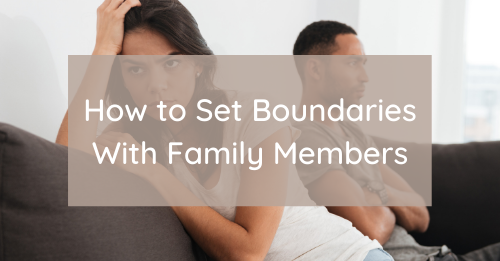Boundaries, even with the people you are closest to, allow you to exist as an individual and give you the autonomy to choose what’s best for you. Setting boundaries with parents or difficult family members is a skill that may require practice. Yet, these protective barriers ensure that your relationships can be mutually respectful, appropriate and caring.
The Problem With Unhealthy Family Boundaries
If you have a toxic relationship with someone in your family, you may continue to devote emotional resources toward that connection, only to feel abused, taken advantage of or depleted in return.
When unhealthy family boundaries are present, you may feel frequently confused, disappointed or resentful. Boundary violations can also contribute to depression, anxiety or substance misuse. Here are some examples of unhealthy family boundaries:
- Family members pry for information that you’re not comfortable sharing.
- They try to manipulate you into doing things you don’t want to do.
- They attempt to control decisions that aren’t theirs to make.
- They seem to enjoy cutting you down.
- Their “teasing” often crosses the line.
- They make you feel bad when you express yourself.
How to Keep Your Family From Overstepping Boundaries
If you have trouble standing up to your loved ones, you’re not alone. It’s often hardest to create and maintain boundaries with those you’re closest to — especially if you’re recovering from drugs or alcohol. With practice, however, you can get better at it. Here are some ways to set boundaries with your family members.
1. Understand What You Need
To develop good boundaries with family, you need to understand what you want out of the relationship or need in certain situations. Maybe you want independence from your family or more positive communication with your sibling. Whatever it is, clarity is key.
2. Be Firm Yet Kind
When faced with toxic comments or behavior from a family member, you have two choices — ignore it or say something. Dropping hints or passive-aggressively defending your boundaries will not establish the lines that your family members should not cross. Instead, be explicit about what’s okay and what is not. That’s the only way you can ensure toxic family members understand your boundaries.
Setting boundaries does not require cruelty. In fact, kindness can disarm a family member’s anger or defensiveness and potentially open them up to a calm exchange and real understanding.
3. Maintain Realistic Expectations
Try not to put yourself in situations that test your boundaries. For example, if you know that attending a family holiday will result in a big blow-up, aim for more realistic expectations. Perhaps you can only be around a certain family member for a limited amount of time — and that’s okay.
4. Be Willing to Walk Away
If a family member is making you feel uncomfortable or upset, you have the option to leave. You don’t have to explain or apologize.
You might want to work things out or defend yourself, but that may result in an unnecessary fight. Leaving may be the better option.
Establishing Healthy Boundaries in Recovery
At 7 Summit Pathways, we encourage family support during your addiction treatment program. Yet, toxic relationships can lead to unhealthy codependency and aggressive communication that can hinder your Recovery process.
If you’re struggling to set boundaries with family members, we can help. We take a personalized approach to Recovery for more holistic healing. Contact us today to start your journey.
